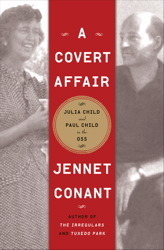What do you think?
Rate this book


416 pages, Kindle Edition
First published January 1, 2011
"How were they to know that disaster lay just around the corner? That what Bernard DeVoto had once called "the avalanching danger" of rumor, insinuation, slander, and malice hung over them all? The quiet men with the credentials were closing in. They never heard them coming."
Reflecting on her late-in-life-success, Julia would often say, "The war made me." She was very nostalgic about her years overseas with the OSS, when she finally came into her own, fell in love, and first tasted the spicy Indian curries and savory Chinese dishes that awakened her senses and her deep affinity for food. Yet she was never inclined to romanticize the past, remaining characteristically clear-eyed and forthright about the demagoguery that had blighted the postwar period. She and Paul had escaped relatively unscathed, but too many friends had not been as fortunate. For all that those years had brought them, they could never look back on that time, and Paul's 'shameful episode,' without bitter regret, like 'the taste of ashes' in their mouths."